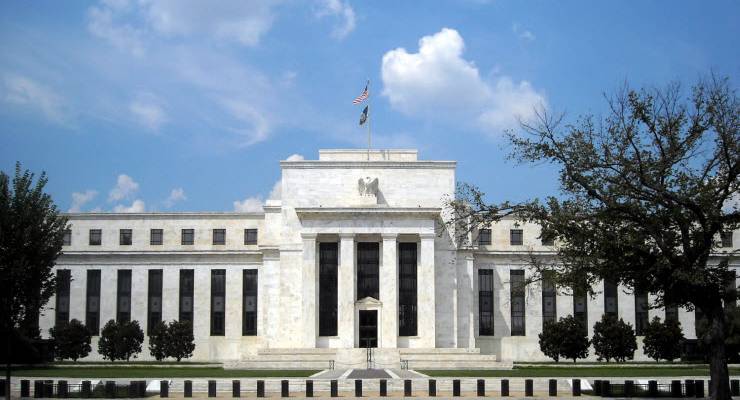
Forget the 175,000 COVID-19 victims in the United States — a number growing by 1000 every day — and rejoice: the S&P 500 is back above its record highs of February.
It only fell across the line with a weak 7.7 point rise, but it finally joined the Nasdaq, which has been hitting records for some time. The Dow Jones Index remains slightly adrift of February records, but still higher than at any point before last November.
Investors have US taxpayers and the Federal Reserve — especially chairman Jay Powell — to thank for the records, because this is a government-run and government-funded rebound.
The US budget deficit has surged to nearly US$3 trillion with two months still to come — more than twice the previous deficit record set in 2009, pumping desperately needed cash into the economy.
And the support packages from the Fed for US banks of all sizes, businesses, states and other debtors has banished fears of a credit crunch and slide that would have made the financial crisis of 2008 look tame.
Instead, its ultra-easy monetary policy stance has helped finance the huge boom in everything except oil.
Record deficits and record low interest rates have also pushed down the US dollar to two-year lows against the yen and euro and a 20-month low against the Aussie dollar.
And the weaker dollar has helped silver, copper, iron ore and even oil recover and steady or rise (iron ore prices hit six-year highs in trading on Tuesday — above US$128 a tonne for the standard Australian style 62% Fe ore shipped to northern China).
It’s the second time during the Trump administration that US taxpayers have done investors a massive favour.
The US deficit was already more than $1 trillion courtesy of corporate tax cuts devised by Trump and the Republicans for their donors, which did nothing for investment or wages but led to a record level of share buybacks and massive dividends for investors.
In Australia, the ASX 200 is still well short of its February record, but has recovered more than half the value lost in the early days of the pandemic.
Investors here can thank the Reserve Bank and the Morrison government’s huge JobKeeper and JobSeeker programs, supported by other industry-specific packages as well as contributions from the states.
All those stories in The Australian Financial Review about clever fund managers (aka fee-clippers) and other financial markets players who made money in the pandemic are just puffery.
When close to $200 billion has been pumped, will be pumped or is backstopping the nation’s banks and wider economy, courtesy of Canberra, the states and the RBA, and some of the most stringent corporate and banking laws have been relaxed, you could give money to a monkey on a keyboard and it will do just as well — and probably with less sexual harassment.
And if taxpayers propping up investors rubs you the wrong way, remember that courtesy of the superannuation system, pretty much all of us are investors, and we all have a vested interest in a better performing sharemarket.
And for a large cohort of the population — the last of the baby boomers and the older members of gen X who are approaching retirement or starting to think about it — it matters a very great deal.
For the next few years, you can forget about the animal spirits of capitalism. Most of us, for varying reasons, will be looking to government to assure us about our economic security.









The decoupling of the sharemarkets from the ‘real’ economy must be obvious to even the most casual observer. It has become totemic for the increasing economic inequity in western societies. Rising sharemarkets are not good news for most of us, despite the connection of individuals through superannuation. If the sharemarket is rising it means 2 things: The first being what Bernard and Glenn have pointed out here – massive public subsidies. And secondly, ‘investors’ in shares are betting that big corporations will do well feeding off the corpse of the future shattered economy that is relevant to ordinary citizens.
Sharemarket performance and superannuation are linked to the economic wellbeing of many Australians, as you say- but that doesnt mean they should be.
Fact is that shares and super depend on deferring and repressing wages, both in Australia and in poorer countries.
Australia and the rest of the world needs to move away from such neo-liberal practice and look to pro-worker, pro-social security, pro-regulation policies.
Yes we are all Superannuation investors. Booming returns give with one hand Yet take with another as we are duped to think that it is all done equitably. Personal returns versus community returns. Taxes levied, fair wages and conditions first and personal gain next.
The authors of this article appear to be spot on with the reasons why the sharemarkets are booming in such terrible times . Something has got to give however as this giant “Ponzi scheme “will have to explode sometime in the future and who will be the losers ? My tip is the ordinary person in the street will be the ultimate losers and the con artist corporation “jack the lads “will escape to their luxury condominiums to count their “ill gotten “gains.
Like your thinking!
Oh they will assure us, rhetorically – whilst at the same time putting the boot into the economy!
The fact that super is so heavily invested in the share market is an obscenity, let alone ethically abhorrent.
Most retirees have children and even grandchildren.
I wonder what would happen if they were given the opportunity to demand that their funds were invested in real things.
What’s the word, infrastructure & development, a functional national rail system to replace the never to return airline industry, a national shipping line for an island continent “girt by sea”.
Little things like that which would benefit the country instead of fattening already obese ticket clippers & the shyster class?